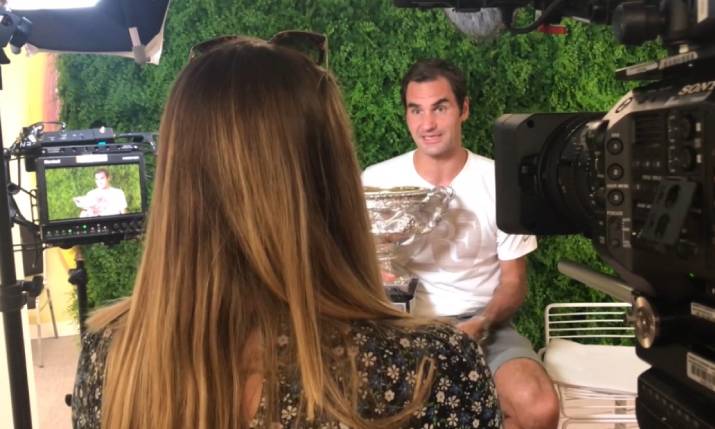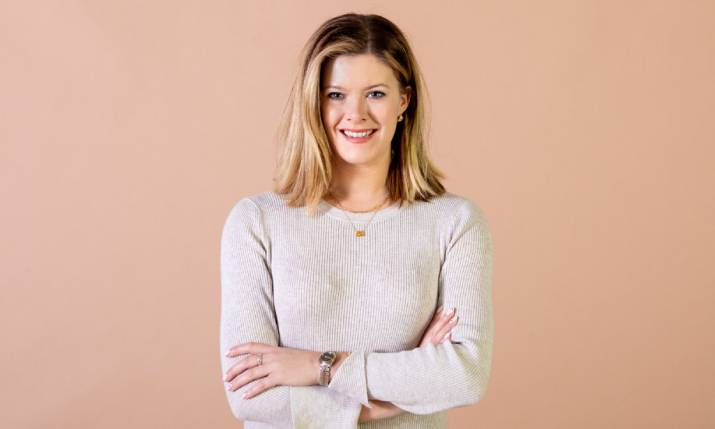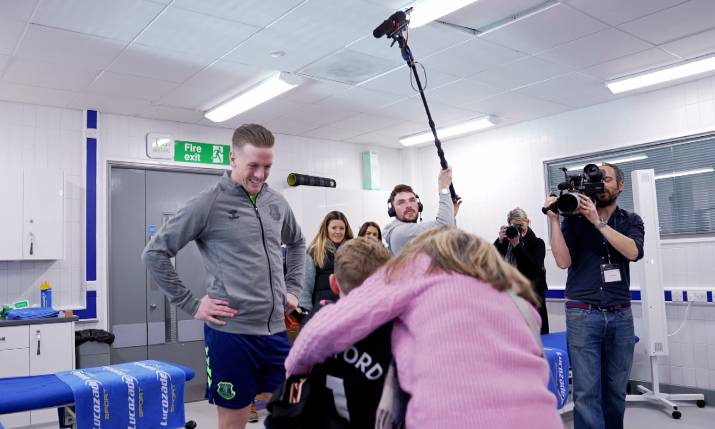Riding high: Galloping along her career path with Premier League Productions’ Digital Originals producer Katie Cassidy

Katie Cassidy interviewing tennis star Roger Federer at the Australian Open in 2018
Katie Cassidy is a producer of Digital Originals for Premier League Productions at IMG. She started out as an avid horse rider, transitioned to broadcasting show jumping and horse racing on TV, and now has a career that has seen her cover a plethora of sports. We chat to Cassidy about how she swapped her stirrups for football boots.
What draws you to your career in live sport?
I love the fact that no day is the same. I could be writing scripts, driving to Newcastle, or stood watching some of the biggest moments in sporting history unfold before my eyes. But to be able to say I was there, I witnessed it and I helped tell the story to the world will always make the job exciting for me.

Katie Cassidy, a producer of Digital Originals for Premier League Productions at IMG
What’s the coolest thing you’ve worked on in the course of your career?
Interviewing Roger Federer at the Australian Open in 2018 following his record-extending 20th and final Grand Slam title will forever be one of the greatest ‘I was there’ moments.
But my most emotional career moment was more recently when PLP’s episode of Fan Mail with Jack Grealish and young Finlay hit the bigtime.
As a team, we worked hard to develop the strand and to all be sat together in the work canteen, watching Jack score that goal against Iran and remembering to do the celebration for Finlay in one of the biggest moments of his career, was a huge moment for us all.
Finlay’s story skyrocketed round the world, achieving over 56 million views across Premier League and Jack Grealish’s social channels. I’d tune into the radio, turn on the news, scroll through twitter and our message was out there and it still feels like a once in a lifetime moment to have a piece that resonated so far and wide.
What advice would you give to other women looking to move into a role in sports broadcasting like your own?
Find your allies through every step of the career ladder. I believe it is so important to support your colleagues and foster strong professional relationships. It will be these people who help drive your success and support your development, potentially even after you’ve long left an account or company.
We have an Employee Resource Group (ERG) at IMG and Endeavor called Women of Endeavor. I am helping roll this initiative out in our studios in Stockley Park and I think having ERGs within companies to help see, support, and connect people from underrepresented groups across the business is imperative to foster a successful and rewarding culture.
I’m looking forward to connecting with more women across the IMG and Endeavor network in the future and hope we can all continue to promote the importance of a diverse workforce and create safe spaces for people to thrive.

Katie Cassidy working on Premier League Productions’ Fan Mail programme with goalkeeper, Jordan Pickford, at Everton Football Club
How did you first find out about TV broadcasting as a career? What was your inspiration or idea, and why sports broadcasting?
I must confess, I stumbled upon sports broadcasting by chance. I had no personal connections to the industry, and it wasn’t on my radar until I was 18 years old. But once I got a small taste, I was absolutely hooked and knew it was where I wanted to be.
“Over the course of my career, being the only woman in the room, experiencing unconscious bias and finding my voice was tricky, and I have sought advice from supportive colleagues along the way. Things have improved, the industry is getting better, and I love where I work”
When I was in school, I competed nationally in both eventing and show jumping. I knew I wanted a career in sport but was battling against the realities of trying to forge a career as a professional athlete. So, I started to think about becoming a magazine journalist after my former English teacher piqued my interest.
When applying for university, I met a horse riding trainer who was also moonlighting as a journalist at a start-up digital magazine agency. I was quick to seek out work experience and completed a year’s apprenticeship, deferring my university place for a year. It was at Field & Rural Life that I got my first taste of production and broadcasting, with the launch of their digital TV platform. I loved the variation of the role and I started to experience my passion for sport in a whole new way.
What has been your career path within TV?
I stuck to the plan and left my apprenticeship after a year to study English Literature at Cardiff University.
During university and whilst out on the equestrian circuit, I met a fellow rider who was an assistant producer at Channel 4 Racing, which was an IMG production at the time. She kindly invited me along to shadow their production assistant on location at Sandown Racecourse and from there I was offered freelance outside broadcast running jobs at various race meets up and down the country.
I was very excited to get the opportunity, but it did require me to be incredibly self-motivated. I would study during the week and on weekends I would drive to whichever race meeting I was working at, be that Newbury, York or anywhere in-between.
I got on well with the entire team and there was fantastic female representation in all areas of production. I felt welcomed and supported and they all gave me opportunity to develop my role and responsibilities.
From OB runner I went on to gain production assistant and floor manager experience. Eventually I was freelancing as an assistant producer, operating the Hego in studio and assisting on feature shoots.
I felt very fortunate to be able to do this in conjunction with my degree. I’d somehow managed to gather nearly four years production experience before I’d even hit graduation.
What has been your career progression since university?
As I approached the end of my university studies, I was keen to find my first full time role in sports production and interviewed for a role at Sunset+Vine. I began working full time as a junior assistant producer while still finishing my degree, sending my final coursework from shoot locations across the globe.
I worked on their Longines Global Champions Tour account, CNN Winning Post and World Sport, but still very much in the equestrian field.
However, after a few months in the job I learned about an available role at Evoke Films at IMG. They were after an assistant producer with equestrian experience, but the role promised an opportunity to work on other sports too. Despite my passion for equestrian sport, I knew that I needed to branch out into other areas and avoid becoming a ‘one-trick pony’ (pardon the pun). I’m also a huge tennis fan and hoped if I could bring them what they needed in equestrian, they would take a chance on me to work on tennis.
I went straight to the Wimbledon Championships and I ended up working on the Rolex account at Evoke Films for nearly five years. It was a wonderful opportunity to work for one of the world’s most iconic brands across both editorial and commercial projects, travel the globe and interview sports biggest stars at some of the finest sporting events. I adored my job but sadly when COVID hit in 2020 the whole thing ground to a halt.
I applied for my next role on a little bit of a wing and a prayer, knowing the challenging social and economic situation the world was in. I’d realised before lockdown that I was ready for a new challenge, so after seeing a role advertised at Premier League Productions (PLP), which is a production partnership between IMG and the Premier League, I bit the bullet and applied.
It was the best decision I ever made. I was interviewed over Zoom and started the job entirely remotely on their features team. I didn’t meet any of my colleagues in person for more than six months and I never even met the producer that hired me!
Interviewing players, directing shoots, editing and producing through Zoom was a whole new experience but I loved the challenge, and it pushed me to be creative, problem solve and think outside the box.
Have you faced any particular challenges since stepping into your current role?
I was promoted in 2022 and in the beginning it was tough. As with all brand-new departments and ventures, Digital Originals started as a small team with lots to do. We were hiring, whilst also trying to develop production plans for the imminent season.
There were both creative and logistical challenges throughout our first few months as we developed formats and implemented new production workflows. But it taught me that hard work, patience and ultimately kindness are some of the most important qualities needed in your team to pull through these challenging periods.
What’s the hardest thing about it?
The hardest thing for me personally is juggling a variety of flagship formats for the Premier League at any one time. These are projects with a lot of stakeholders and once you’ve had one viral hit, the quest for that next tentpole moment means the pressure can feel high. But I love the pressure. If you can relish that challenge, it makes the pay-offs feel even sweeter.
What do you enjoy about it?
I produce a series called Fan Mail, which is an incredibly rewarding production to lead. I feel very fortunate to have met some wonderful people, both at football clubs and in the fan community. The fact these people trust me to tell their stories to the world will always remain a huge privilege and I make sure to never take that for granted.
What challenges have you faced over the course of your career?
I have been very fortunate in my career but that’s not to say it’s been easy. Initially, I don’t think I realised how male dominated the industry was. In my early years, I was able to look up to many women who held senior roles in the productions I worked on, both on and off camera. I could see people like me in all areas, I was supported by them, and a path to the upper echelons of broadcast and production looked achievable for women.
However, moving through other areas of the industry, I did feel that gender disparity and it has taken me some time to adjust. Over the course of my career, being the only woman in the room, experiencing unconscious bias and finding my voice was tricky, and I have sought advice from supportive colleagues along the way.
Things have improved, the industry is getting better, and I love where I work. Any negative experiences in my past have only given me a greater drive to be successful and use my position to celebrate and promote female advancement across the business.
What’s the most challenging thing about working in live sport today, or generally, and why?
Our goal is to grow, strengthen and diversify fandom of the Premier League, clubs and players across the globe in partnership with the League and licensees. We do so by creating short and long form digital-first content that attracts, engages and retains fans.
The most challenging aspect is understanding our audience, leveraging insights and measuring the impact of the content, so that we are sharp and informed in our commissioning process and create with maximum effectiveness. At PLP, we created an insights and analytics team which, in conjunction with strengthened relationships with broadcasters, we have been able to better measure our success and refine our strategy.
The technologies used in sports broadcasting have evolved rapidly over recent years. What for you in your day-to-day job is the most exciting?
At PLP, we are undertaking a full root to branch review of our current workflows with the aim of using artificial intelligence (AI) products and tools to address the manual, repetitive and lengthy processes we have within the business.
We have made particular progress in the editing space with our partner WSC, which has enabled us to create quality work at scale, such as montages and highlights in various formats and ratios.
We have also experimented in creating 360 video on demand (VoD) experiences in response to the growth of spatial computing and virtual reality (VR).
The introduction of Greenfly to PLP has enabled us capture short-form mobile content from games and deliver it in real time to the fingertips of our broadcasters, putting social media managers and their channels pitch side.
This raw, point of view (POV) footage takes our audiences closer in a way that a broadcast camera can’t. The pitch side capture is complemented by fan-focussed content too that brings to life what a Premier League matchday feels and sounds like.

